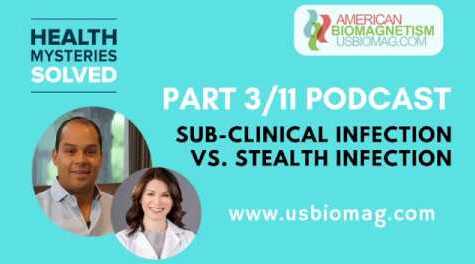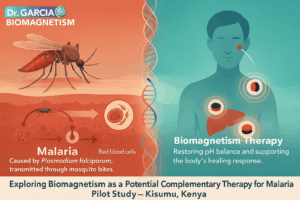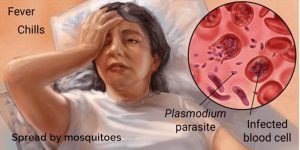
Subclinical Infection
vs
Stealth Infection

Subclinical Infection vs. Stealth Infection
[Podcast part 3/11]
Dr. Inna Topiler: I just wanted to check you were talking about subclinical infections, is that the same thing as saying stealth infections? Because that’s a word that’s kind of been more of a popular word in the functional medicine space.
Dr. Garcia: Stealth as opposed to it’s there, but it can’t be detected. And so, once again, as I mentioned before, you know, nobody is asking or searching about dengue or malaria, for that matter, or underlying tuberculosis or your Shinya pestis or mycoplasma pneumonia. Unfortunately, only Lyme literate doctors and functional medicine doctors are checking patients for mycoplasma pneumonia and Epstein Barr virus and other co infections or,you know, stealth infections. But that’s only the tip of the iceberg. And so through the Bio-energy work, you can muscle test and inquire as to what other self infections. And so people have no idea how many self infections are being caused by dairy. You know, dairy. Unfortunately, even though milk feeds mammals of all species around the world, well, the milk and dairy products can also feed bacteria, virus, fungus and parasites. So even though in a lyme patient or a chronic fatigue patient, there may be. Yes, three or four co-infections, the main ones, well, if they continue to eat dairy, they’re feeding certain staph infections that are causing additional acne or they’re feeding certain fungal infections such as Candida throughout the body. And so, unfortunately, due to our nutrition or lack thereof of proper nutrition, we are feeding these other stealthy infections that. In the background, contribute to a whole complex array of symptoms that contribute to bring down that individual’s immune system.
Dr. Inna Topiler: Now, from a conventional perspective, you know, how would doctors go about testing infections even if, let’s say they knew that they wanted to test for some of these other infections that aren’t as often tested? What would they do? Would it be blood work or w hat types of tests are there?
Dr. Inna Topiler: Now, from a conventional perspective, you know, how would doctors go about testing infections even if, let’s say they knew that they wanted to test for some of these other infections that aren’t as often tested? What would they do? Would it be blood work or w hat types of tests are there?Dr. Garcia: Yes. So unfortunately, it is very difficult to test for some of these. So, for example, the majority of doctors suspect underlying tuberculosis infection. Well, the most common is the tuberculin test, the skin test, where the tuberculin protein is injected subcutaneously underneath the skin. And then for the next 24 to 72 hours, that skin, that area of skin on the arm is observed to see what type of reaction occurs. And so oftentimes people will have a kind of edema or inflammation of the area. And oftentimes doctors will say, oh, yes, it’s positive. But you know what? If you’re from Europe or, you know, in your youth you had respiratory infections, well, then you’ve been exposed to it. And so that’s why you’re testing positive. Let’s do a quick chest X-ray and rule out that you currently have tuberculosis. And so they’ll do the chest X-ray and the chest X-ray comes back normal. However, the fact that that tuberculin skin test comes back positive or slightly positive means you’ve been exposed means that bacteria is in your body laying in wait for your immune system to drop significantly in order for it to come up. And so six months down the road, a year down the road, all of a sudden you’re diagnosed with pneumonia. And turns out underlying the pneumonia is tuberculosis or a mycoplasma pneumonia or Pneumocystis Carini fungal infection. And so there are so many layers of infections that they’re just they’re lying in wait. And they’re not high enough to be detected in typical blood tests and laboratory panels. And they’re also very, very expensive. And the number one confirmation for tuberculosis is to actually do a bronchoscopy, where you slide a tube literally down the individual’s throat and collect a bronchial aspiration of mucus all the way in the lungs. And so that’s not a very easy to do procedure. It’s quite invasive and costly. And so nobody wants to do that unless you’re suffering from a severe pneumonia that’s resistant to a lot of things. As well as once you have that culture, it’s going to take three to four weeks for it to come back positive for tuberculosis. Yeah. So it’s very difficult, but it’s something that you have to think about and something that I observe literally on a daily basis in my practice. And fortunately with magnets, it can the body can be stimulated to the point where it will heal itself of many, many different infections.
Dr. Inna Topiler: Yeah, and I’m really excited to get into all of this and tell all of the listeners about this.





